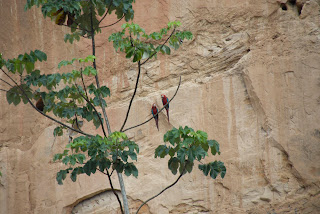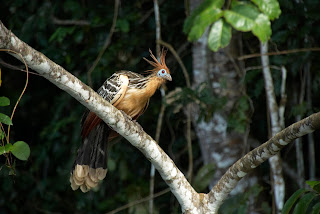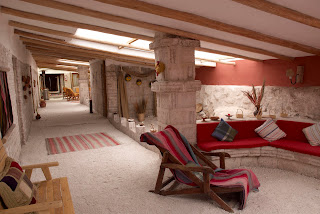
Bolivia is a disappointment. There is little scope in this country of extreme altitudes and diverse wonders to add meaty detail to the cockroach scale of hotels. Reasonable comfort comes cheap and clean and the cockroaches exist mainly where they should be, as part of the Amazonian rain forest eco system. There, even the largest cockroaches are as nothing compared with the hand sized hairy grey spiders frequenting basins, bathrooms and verandas; the builder spiders with huge swollen abdomens, caught in night walk torch beams busily weaving intricate webs that disconcertingly wrap your face on morning treks and giant, scary but relatively harmless tarantulas irritated into appearance by a gentle but insistent twig poking into their nests. Forest guides instruct that the truly dangerous spiders have visible red fangs – visible if you are prepared to get up close and personal enough to check.
Chalalan Ecolodge in Madidi National Park is run by the local community who have lived in the area for hundreds of years and know the rain forest and its other inhabitants like the backs of their hands. Reached by boat, 5 hours or more, from the small town of Rurrenabaque where a tiny tropical airport reminiscent of a Graham Green film set provides reasonably reliable air connections with La Paz, Chalalan is as isolated in the forest as one could hope although an instant international community of fellow visitors somewhat dispels any serious sense of solitude. As evening falls, the voices and laughter of several boatfuls of guests on the lake by the lodge suggest a more populated setting as they spot the colourful and clumsy hoatzin or stinkbirds, their complicated genealogy possibly linking them to the flying dinosaurs; the elusive and, swimmers are assured, friendly caiman and high living red howler or capuchin monkeys glimpsed playing noisy tag up in the canopy where they are threatened only by the long talons of hungry harpie eagles.
The Chalalan community takes guardianship of its forest home seriously. Men may hunt as they have always done, the odd deer for instance for the pot, but even the meanest bug, a nasty painful killer or bullet ant for instance, will be avoided, not killed without good reason, nor the clinging strangler fig, that will suck the lifeblood from other better and more beautiful forest trees, be cut back to its roots. It is nature, red in tooth and claw as we all know and the rain forest is not a soft or hospitable place.

An overrunning rainy season that has caused flooding and bank erosion in Amazonian rivers and landslides in La Paz has made the trails round Chalalan wet and muddy and unconducive to the spotting of a rare jaguar or tapir or the great snakes well-hidden in murky undergrowth. Instead we enjoy glimpses of peccary, the wild forest pigs; macaws, best through the Chalalan telescope, broadcasting their loud domestics to the wider forest; get an instant education in strange forest flora like the walking palm and the cat’s claw vine, in their idiosyncratic lives, survival mechanisms and local uses and, sliding in the mud, try to avoid unwary grabbing of handy trees and vines often covered with sharp spikes or self protecting biting things. Much of life continues undisturbed a hundred feet above in the canopy and one longs for harpie wings to explore from the air to see more of the monkeys than the badly focused hairy blobs caught between branches in my ever hopeful photographs.
We stay in lodges raised above the ground, some with attached bathrooms, others where a trip to the loo in the night is a nerve wracking experience when armed only with a small torch that makes little impact on the intense forested dark as indistinct blobs race away from your flipflops down the verandah steps. Beds are comfortable with mosquito nets providing a flimsy sense of security – in the forest clouds of their relatives follow your path, kept at bay by the sort of deet insect repellent that pins your face to your skull when applied. Electricity is solar powered, or, as in our case, not, due to a defunct battery; a minor irritation only given the desire for sleep induced by rich fresh air, dark night walks, home and away team evening football games and a powerful line in cocktails made by a young barman with a very liberal hand. Food is home cooking; a stew, vegetables, light soups, salads, juices and home- made bread plus a less natural line in puddings. The chocolate mousse, more of a bizarre soup must have come from an Angel Delight packet, a pity in this deliciously chocolate fuelled country; and then tinned peaches. Nothing much wrong with a tinned peach mind you.

So, a cockroach hotel I suppose but by design. Elsewhere in Bolivia, high altitudes discourage bug life as much as the well swept rooms, clean linen, showers and loos that actually work and even heaters and electric blankets in the coldest places or, improbably and delightfully for cold feet, fleece sheets – forget that crisp ice cold linen, these are the way forward for chilly souls. In the Salar de Uyuni, the high salt desert in the south west of the country, turned during the wet season into a gigantic natural mirror, the hotel is made of salt bricks, even the beds and tables hewn from great slabs of salt, bright rugs saving feet from a floor that looks like an explosion of dishwasher salt.

In the remote Siloli desert with its mineral coloured lakes, hot geysers and rocks like petrified forestry, we play testing games of bananagrams at an altitude of 4,600 metres in a hotel that really is in the middle of nowhere. When the generator shuts down the darkness is complete and, we are told, a duende, a ghost or incubus, prowls the passages, luckily only bothering Bolivian guests in their beds. It is generally believed that the duende is the unquiet spirit of a workman killed as sacrifice to Pachamama, the all pervasive mother goddess, and duly placated enough by blood to bring luck to the hotel. Our female guide has to share a room with our indefatigably brilliant jeep driver and the duende fails to put in any appearance to detract from the fleecy sheeted comforts of this frosty oasis under its endless canopy of stars.
















